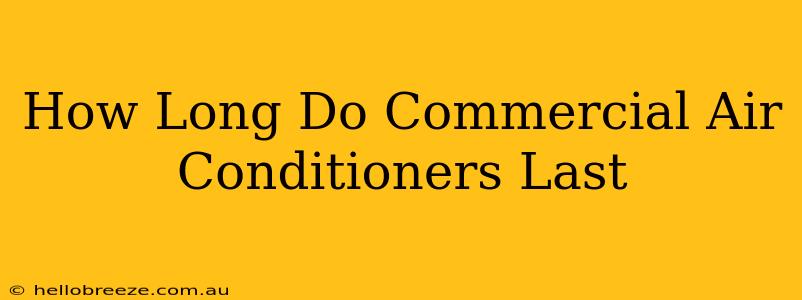Commercial air conditioners are significant investments, keeping businesses productive and comfortable. Knowing their lifespan is crucial for budgeting, maintenance, and replacement planning. But how long do commercial air conditioners last? The answer isn't a simple number, but rather a range influenced by several key factors. This comprehensive guide will delve into the specifics, helping you understand what to expect from your system.
Factors Affecting the Lifespan of Commercial AC Units
Several factors significantly influence the longevity of your commercial air conditioner. Understanding these will help you extend its life and plan for eventual replacement.
1. Type of System:
- Rooftop Units: These are common for smaller commercial spaces and typically last 10-15 years with proper maintenance.
- Split Systems: These consist of separate indoor and outdoor units and can last 15-20 years or longer with consistent upkeep.
- Chillers: Used in larger buildings, chillers can have a lifespan of 20-25 years or more, depending on the model and maintenance.
2. Maintenance and Service:
This is arguably the most crucial factor. Regular maintenance, including annual inspections, cleaning of coils, and filter changes, significantly extends the lifespan. Neglecting maintenance can lead to premature failure and costly repairs. Think of it like a car – regular servicing prevents major issues down the line.
3. Usage and Operating Conditions:
The more frequently and intensely your system operates, the faster it will wear down. Extreme temperatures and high humidity put extra strain on the components. Similarly, constantly running the system at its maximum capacity will reduce its lifespan.
4. Quality of Installation:
A poorly installed system is more prone to problems and reduced lifespan. Professional installation by a qualified technician is vital. Cutting corners during installation can lead to costly repairs and a shorter operational life.
5. Brand and Model:
The quality and reliability of the manufacturer play a role. Reputable brands often utilize higher-quality components and offer better warranties, potentially resulting in a longer lifespan. Always research and compare different brands and models before making a purchase.
Signs Your Commercial AC is Approaching the End of its Life
Recognizing the signs of an aging system is key to avoiding costly breakdowns and ensuring your business stays cool. Look out for:
- Frequent Repairs: If you're constantly calling for repairs, it may be a sign that your unit is nearing the end of its life. Repeated repairs can become more expensive than a replacement.
- High Energy Bills: An aging system becomes less efficient, leading to a noticeable increase in energy consumption and higher utility bills.
- Unusual Noises: Loud banging, rattling, or squealing sounds often indicate wear and tear on internal components.
- Inconsistent Cooling: If your system struggles to maintain the desired temperature or only cools certain areas effectively, it might be time for an upgrade.
- Leaking Refrigerant: Refrigerant leaks can indicate a serious problem and necessitate immediate professional attention.
Planning for Replacement
Replacing a commercial air conditioner is a major decision. Consider these factors:
- Budget: Factor in the cost of the new unit, installation, and potential downtime.
- Energy Efficiency: Look for energy-efficient models to save on operating costs in the long run. Consider SEER ratings.
- Capacity: Ensure the new system has the appropriate cooling capacity for your space.
By understanding the factors influencing the lifespan of your commercial air conditioner and recognizing the warning signs, you can proactively manage its life cycle, minimizing disruptions and maximizing your investment. Remember that regular maintenance is your best bet for extending the life of your system and keeping your business running smoothly.

